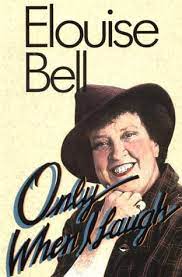Articles/Essays – Volume 25, No. 2
I Laugh, Therefore I Am | Elouise Bell, Only When I Laugh
A student of Zen Buddhism meditated daily on koans assigned by the Zen master. None of his insights impressed the master until one day, after years of thought about these puzzles, the student timidly began his exposition of a koan and then burst into uncontrollable laughter, at which point the Zen master clapped him on the back and shouted his congratulations.
Laughter is not necessarily the appropriate response to every koan or to all of life’s mysteries and travails, but Elouise Bell, like the Zen master, leads us to suspect that laughter may be one of the great liberating forces in the universe. Indeed, I laugh, therefore I am (which Bell may well have coined) is probably a more useful precept than that originated by Rene Descartes. From Descartes’ time to our own, the world has been awash with the weighty thoughts of competing philosophies—many of them ridiculous and some downright dangerous. Imagine, for example, how different history might have been had Elouise or an equally gifted wit cut her teeth on a turgid copy of Das Kapital when it first plopped off the press.
The thirty-six entries included in Only When I Laugh cover a range of cultural topics from Z (for zucchini) to C (for Christmas). Many were originally published in Bell’s Network column. Their col lection in book form is a stroke of good luck for those interested in literary history, because her work represents a rare genre in Utah and Mormon letters. Utah has poets aplenty, historians, writers of song lyrics and fiction in its many forms, and even playwrights and philosophers—but where are the humorists (other than cartoonists)? Possibly the late Pulitzer Prize winner and one-time Utahn Phyllis McGinley fits in this niche, as does the late Salt Lake Tribune columnist Dan Valentine. Really, though, the field isn’t overpopulated.
Bell’s humor is disarming rather than armor-piercing; moreover, it usually directs the reader to a closer examination of life and the cultural norms we live by. “The Mug-wump” asks us to look again at the extremist positions of the clenched fist feminist and the don’t-you-dare-call me-one-of-them camps. Bell engages the reader in a dialogue that gently restores equilibrium by dispelling the polarizing notion that true-believer zeal is superior to a more open, less vehement view. In the context of Only When I Laugh, we could call it the Elouisean mean.
“The Meeting” is classic satire. It de scribes a typical Sunday morning church service in a familiar format of announcements, music, and talks; but in this instance all the key players are women—not in a one-time role reversal—but as the obvious norm. When these women speak, pat and patronizing phrases about the opposite sex tumble unawares from their lips:
Next weekend is a big one for the younger teens in our congregation: the Beehive class is going to kayak down the Green River, under the direction of Sister Lynn Harrison. And as I understand it, the deacons will be here at home, helping to fold and stamp the ward newsletter.
In the Young Men’s meeting tonight, the boys will have something special to look forward to—a panel of Laurels from the stake will discuss “What We Look for in Boys We Date.” Here’s your big chance boys! (p. 13)
“Call Me Indian Summer” is a spoof of the idea that each person’s coloring relates to one of the four seasons and that cosmetic and clothing colors should be chosen with that in mind. Bell suggests that four is not enough, recalling “an aunt . . . who was clearly Ground Hog’s Day” and “a friend in Logan [who] is the Fourth of July” (p. 99).
Most readers will not be disciplined enough to place Only When I Laugh on a bedside table for thirty-six nights of bedtime reading but will keep saying, as I did—just one more chapter before I turn out the light. So, we must nurture Elouise as we would the rare sego lily (when was the last time you saw one?); her insights and humor are sorely needed.
Only When I Laugh by Elouise Bell (Salt Lake City: Signature Books, 1990), 136 pp. $9.95.


 Back to full Issue
Back to full Issue

